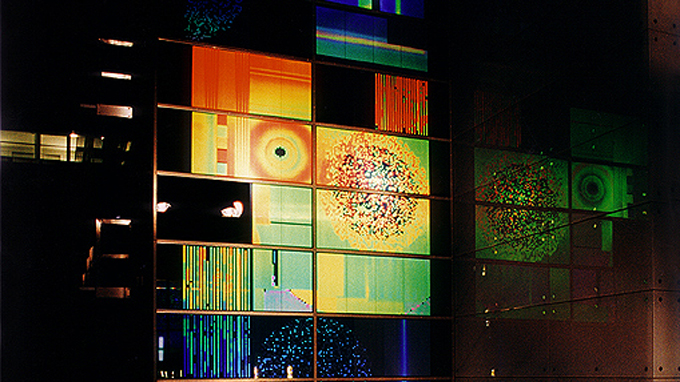Collaborative Research Centres and Transregios
 View of the DFG building in Bonn. Photo: DFG.
View of the DFG building in Bonn. Photo: DFG.
SFB 631 Solid State Based Quantum Information Processing
The Collaborative Research Center (SFB) 631 studies the physical concepts, materials aspects, and technological foundations of solid-state quantum information processing. This interdisciplinary research field has the potential to revolutionize many areas of science and technology. It deals with the coherent dynamics of solid-state quantum systems and has the daring vision to be able to process and communicate information on the basis of quantum mechanical principles.
- Spokesperson:
- Rudolf Gross
- Participating scientists:
- Gerhard Abstreiter, Martin S. Brandt, Ignacio Cirac, Jonathan Finley, Alexander Holleitner, Michael Kaniber, Gregor Koblmüller, Gerhard Rempe, Martin Stutzmann, Peter Vogl
SFB 749 Dynamics and Intermediates of Molecular Transformations
For the improvement of chemical reactions and in order to get a deeper understanding of basic chemical and biochemical processes, the investigation of the dynamic properties of molecules and biomolecules is increasingly necessary. The core of this investigation requires an alliance of chemistry and biochemistry with theoretical and physical chemistry. The common goal of the Collaborative Research Center (SFB) 749 is to obtain a deeper understanding of reactions and folding mechanisms.
The SFB 749 holds a close collaboration with the Excellence Cluster CIPSM.
- Participating scientist:
- Martin Zacharias
SFB 863 Forces in biomolecular systems
The major goal of this collaborative research center is to improve our understanding of force-driven mechanical processes in complex biomolecular networks from the single molecule to the whole cell level.
- Spokesperson:
- Matthias Rief
- Participating scientists:
- Andreas Bausch, Hendrik Dietz, Thorsten Hugel, Friedrich Simmel, Matthias Zacharias
SFB 1035 Control of protein function by conformational switching
The CRC aims at understanding the principles that allow regulation of protein function by structural transitions between different protein conformations. So far, aspects of the topic have been addressed only in the context of specific studies but not with the goal to establish general principles that correlate structure, plasticity and activity of proteins.
- Participating scientists:
- Matthias Rief, Matthias Zacharias
SFB 1258 Neutrinos and Dark Matter in Astro- and Particle Physics
The research focus of the SFB 1258 "Neutrinos and dark matter in astro- and particle physics" lies at the crossroads of particle physics, astrophysics and nuclear physics. It concerns neutrinos, the most abundant matter particles of our universe, and dark matter, that has been driving the dynamics of the universe at galactic scales and beyond. Recent experimental results have propelled our understanding of this interdisciplinary research field to a new level, but key fundamental questions are yet to be answered.
- Spokesperson:
- Elisa Resconi
- Participating scientists:
- Matteo Agostini, Martin Beneke, Shawn Bishop, Laura Fabbietti, Björn Garbrecht, Mathias Garny, Alejandro Ibarra, Susanne Mertens, Lothar Oberauer, Elisa Resconi, Stefan Schönert, Raimund Strauss, Patrick Vaudrevange, Andreas Weiler
SFB/TR 27 Neutrinos and Beyond – Weakly Interacting Particles in Physics, Astrophysics and Cosmology
This Collaborative Research Center/Transregio (SFB/TR) centered on several key issues uin the study of weakly interacting particles using a coherent and unified approach.
The project run from 2007 to 2010.
- Spokesperson:
- Lothar Oberauer
- Participating scientists:
- Allen Caldwell, Franz v. Feilitzsch, Marianne Göger-Neff, Hans-Thomas Janka, Michael Ratz
TR 80 From Electronic Correlations to Functionality
To explore the properties of homogeneous and inhomogeneous correlated matter, the Transregio will develop analytical tools that will open new perspectives for the investigation of the electronic behavior of complex materials. By combining the existing novel instrumentation and the theoretical tools available at the participating institutions, the Transregio will develop the research area of electronic correlations into a field where basic research and functional, application-relevant aspects are merged.
- Deputy spokesperson:
- Peter Böni
- Participating scientists:
- Dirk Grundler, Rudolf Hackl, Christoph Hugenschmidt, Wolfgang Kreuzpaintner, Amitesh Paul, Winfried Petry, Christian Pfleiderer, Marc Wilde
CRC 110: Symmetries and the Emergence of Structure in QCD
The Sino-German CRC 110 deals with one of the most challenging problems in contemporary theoretical physics, namely the theory of strong interactions QCD. The CRC focusses on the emergence of structure like hadrons and nuclei and the role of symmetries in QCD. This is the first time that such a unified approach of hadronic and nuclear physics is attempted.
- Participating scientists:
- Martin Beneke, Nora Brambilla, Norbert Kaiser, Stephan Paul, Antonio Vairo